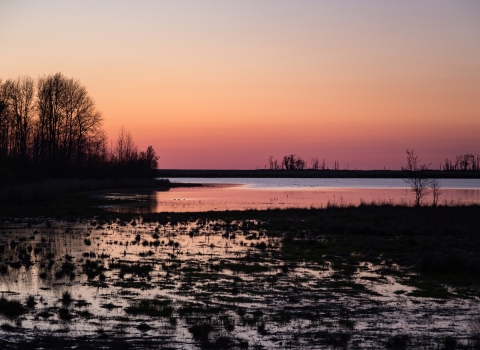The U.S. Fish and Wildlife Service is reopening the comment period on its 2018 proposal to list the black-capped petrel as a threatened species under the Endangered Species Act (ESA). We are reopening the comment period to present significant new information received since the 2018 proposed listing that is relevant to consideration of the status of the species. During this 30-day comment period, we encourage those who may have commented previously to submit additional comments, if appropriate.
Black-capped petrels are pelagic seabirds that only nest on the island of Hispaniola in the Caribbean. Known as one of the gadfly petrels because of their speedy, weaving flight, black-capped petrels are widely distributed and travel long distances to foraging areas in the western Atlantic and southern Caribbean basins and the central and northeastern Gulf of Mexico. Recent satellite tracking studies have also documented their use of near-shore areas off the northern coast of Central and South America. Officially known as the black-capped petrel in current ornithological literature, it is also known by several distinct common names throughout its range, like “diablotin” (French and Spanish-speaking range states), “chathuant” (Haiti), and “bruja” or “chanwan” (Cuba).
“These remarkable seabirds are in need of protection and the Service has heard from a number of researchers that threats are greater than what we originally assessed for our 2018 proposal,” said Mike Oetker, acting Service Regional Director. “Utilizing new information that we have received since the earlier proposal, we are now reopening the comment period and presenting the new data to ensure that our decisions for the black-capped petrel are based on the best available science.”
The magnitude of threats to black-capped petrels is likely larger than what we had previously assessed in our 2018 proposal to list them as a threatened species under the ESA. Threats to black-capped petrels include habitat loss from deforestation and direct mortality to adults, chicks, and eggs from depredation by non-native mammals (dogs, cats, and mongoose). New information received since the 2018 proposed listing quantifies the reduction in reproductive success due to depredation and also shows that the amount of suitable nesting habitat is much lower than previously described. The Service has also received new information regarding additional threats such as development and terrestrial mining.
The Species Status Assessment (SSA) report published in 2018 will be updated to include all new relevant information and will thoroughly evaluate the best scientific and commercial data to inform a final listing determination. Reopening the comment period ensures that interested stakeholders are aware of and have an opportunity to comment on this new information before we make our final determination with respect to the black-capped petrel’s status.
Today’s announcement comes as the ESA turns 50 years old in 2023. Throughout the year, the Department of the Interior will celebrate the ESA's importance in preventing imperiled species' extinction, promoting the recovery of wildlife and conserving the habitats upon which they depend.
The ESA has been highly effective and credited with saving 99% of listed species from extinction. Thus far, more than 100 species of plants and animals have been delisted based on recovery or reclassified from endangered to threatened based on improved conservation status, and hundreds more species are stable or improving thanks to the collaborative actions of Tribes, federal agencies, state and local governments, conservation organizations and private citizens
The comment period on the proposed listing will be reopened for 30 days. Comments must be received by 11:59 p.m. Eastern Time on June 1, 2023.
You may submit comments by one of the following methods:
(1) Electronically: Go to the Federal eRulemaking Portal: https://www.regulations.gov. In the Search box, enter FWS-R4-ES-2018-0043, which is the docket number for this rulemaking. Then, click on the Search button. On the resulting page, in the panel on the left side of the screen, under the Document Type heading, check the Proposed Rule box to locate this document. You may submit a comment by clicking on “Comment.”
(2) By hard copy: Submit by U.S. mail to: Public Comments Processing, Attn: FWS-R4-ES-2018-0043, U.S. Fish and Wildlife Service, MS: PRB/3W, 5275 Leesburg Pike, Falls Church, VA 22041–3803.
Supporting materials including the new information and updated SSA are available at https://www.regulations.gov at Docket No. FWS-R4-ES-2018-0043.
FOR FURTHER INFORMATION CONTACT: Edwin Muñiz, Field Supervisor, U.S. Fish and Wildlife Service, Caribbean Ecological Services Field Office, caribbean_es@fws.gov; telephone 786-244-0081. Individuals in the United States who are deaf, deafblind, hard of hearing, or have a speech disability may dial 711 (TTY, TDD, or TeleBraille) to access telecommunications relay services. Individuals outside the United States should use the relay services offered within their country to make international calls to the point-of-contact in the United States.
The mission of the U.S. Fish and Wildlife Service is working with others to conserve, protect, and enhance fish, wildlife, plants, and their habitats for the continuing benefit of the American people. For more information on our work and the people who make it happen, visit www.fws.gov. Connect with our Facebook page at www.facebook.com/usfwssoutheast, follow our tweets at www.twitter.com/usfwssoutheast, watch our YouTube Channel at http://www.youtube.com/usfws and download photos from our Flickr page at http://www.flickr.com/photos/usfwssoutheast.



